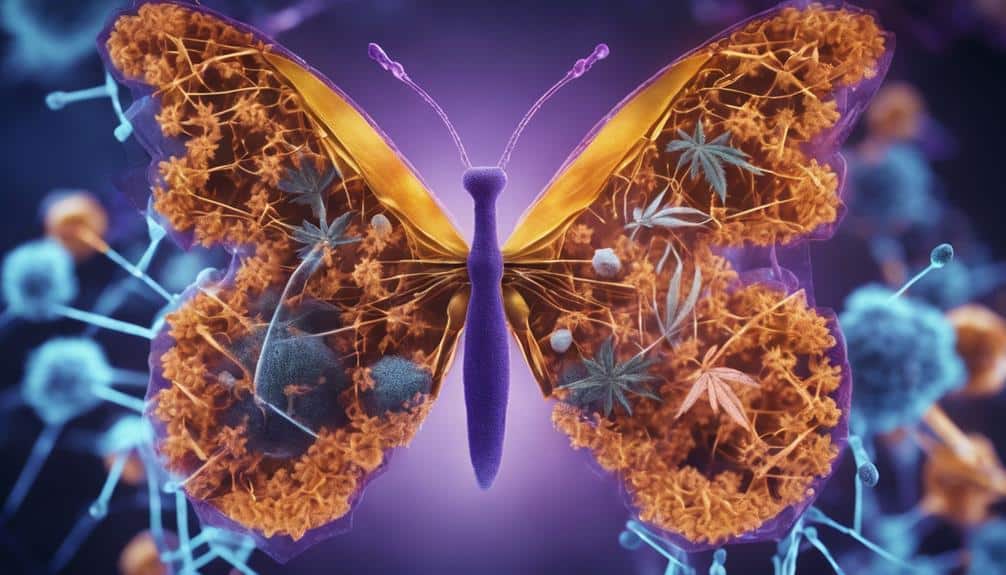Did you know that over 50 million Americans suffer from autoimmune diseases, according to the American Autoimmune Related Diseases Association?
Table of Contents
You might have heard about the potential of medical cannabis as a therapy for these conditions. As a natural plant-based substance, cannabis holds promise due to its unique interaction with the body’s endocannabinoid system.
But how exactly does it work, and what’s the scientific consensus? As we delve deeper into this topic, you’ll gain a clearer understanding of the potential role of cannabis in managing autoimmune diseases.
Understanding Autoimmune Diseases

To fully appreciate the potential benefits of cannabis for autoimmune diseases, it’s crucial to first understand what autoimmune diseases are and how they affect your body. Simply put, autoimmune diseases occur when your body’s immune system mistakenly attacks your own cells, perceiving them as foreign invaders. This error in the immune response can lead to various disease triggers, each manifesting a unique set of symptoms.
The primary role of the immune system is to protect the body from harmful substances like bacteria and viruses. However, in cases of autoimmune diseases, this protective response is misdirected—often with devastating consequences. This misdirection can be triggered by factors such as genetics, environmental toxins or even certain infections. Disease triggers could range from specific foods to stressors leading to inflammation and damage to various body tissues.
Understanding these disease triggers and their role in immune response is essential for effective management of autoimmune conditions. This is where cannabis shows promise. The plant’s compounds have properties that can potentially modify the immune response, offering hope for those suffering from these complex diseases. With further research, we could better harness cannabis’s potential for autoimmune disease treatment.
Cannabis: A Brief Overview
When exploring the world of cannabis, you’ll find it’s a complex plant with hundreds of compounds, each with unique properties that are gradually being unraveled by scientists. You’ll encounter terms like cannabinoids, flavonoids, and terpenes that form the backbone of this intriguing plant.
Cannabis legalization has been a hot topic worldwide, creating a paradigm shift in how society perceives this once stigmatized plant. With this shift, there has been a massive surge in plant cultivation—moving it from the shadows into technologically advanced grow systems. These systems allow for careful control of environmental factors to maximize the plant’s therapeutic potential.
The cultivation of the plant and its accompanying research are now intertwined—revealing exciting medical prospects. As science peels back the layers of this plant, it’s becoming clear that cannabis is more than just THC and CBD. The full spectrum of the plant contains a universe of compounds that interact with our body’s endocannabinoid system in increasingly understood ways.
As our understanding deepens, the potential role of cannabis in treating various ailments—including autoimmune diseases—becomes less about ‘if’ but ‘how’. This exciting journey of discovery is only just beginning.
Medical Cannabis and Autoimmunity: The Connection

Unpacking the potential of cannabis in the medical field, we now examine its role in managing and possibly even treating autoimmune diseases—where the body’s own defense system turns against itself. The connection lies in cannabis’s unique interaction with our body’s endocannabinoid system, which regulates immune response among other functions. Scientifically, this offers a promising avenue for autoimmune disease management.
In terms of Cannabis legality, it’s important to note the changing landscape. With shifting legalities globally, access to medical cannabis is increasing. This has given rise to a wealth of patient testimonials revealing the potential benefits of cannabis for autoimmune conditions. Patients report reduced inflammation, alleviated pain, and improved quality of life—reflecting the promise of this natural remedy in the face of debilitating conditions like rheumatoid arthritis, lupus, and multiple sclerosis.
However, it’s crucial to remember that patient testimonials—while valuable—are not a substitute for rigorous scientific research. The path to understanding the full potential of cannabis in treating autoimmune diseases is complex and ongoing. As you navigate this evolving field, remember to seek advice from healthcare professionals and stay informed about the latest research and legal changes.
Current Research on Cannabis for Autoimmune Diseases
Let’s delve into current research where scientists are tirelessly working to unravel the potential role of cannabis in treating autoimmune diseases. It might surprise you that cannabinoid receptors play a significant role in this approach.
Research suggests that cannabis—with its anti-inflammatory properties—can help manage autoimmune conditions due to active compounds known as cannabinoids which interact with our body’s endocannabinoid system. Here are some key findings:
- Cannabinoids can attach to cannabinoid receptors in the body, helping to regulate the immune system and inhibit inflammation.
- Specific cannabinoids, such as cannabidiol (CBD), have shown promising anti-inflammatory effects in lab studies.
- Some research indicates that cannabinoids could potentially slow the progression of certain autoimmune diseases.
- Clinical trials are underway to further investigate the therapeutic potential of cannabis for autoimmune diseases.
Potential Risks and Benefits of Cannabis Treatment

While current research paints a promising picture, it’s important to also consider the potential risks and benefits of using cannabis for autoimmune diseases. On one hand, cannabis offers potential relief from pain, inflammation, and other debilitating symptoms. It might offer an alternative or supplement to traditional treatments—potentially reducing reliance on medications with harsh side effects.
On the other hand, you must grapple with issues related to Cannabis legality. In some regions, using or possessing cannabis is still illegal—which can limit access and raise legal concerns. It’s crucial to understand your local laws before considering cannabis as a treatment option.
Moreover, managing side effects is another significant factor to consider. Some people may experience adverse effects like dizziness, fatigue or altered mental state. It’s also possible that cannabis could interact negatively with other medications. You’ll need to work closely with your healthcare provider to monitor and manage these potential side effects.
Conclusion
Imagine you’re in a vintage apothecary, surrounded by ancient remedies. Now, picture cannabis—an old remedy with modern promise—potentially changing the game for autoimmune diseases. Despite the evident risks, the benefits could be life-changing. Remember though, we’re still in the early stages of research.
I want to extend an invitation to you. Why not visit Cannabis Docs of Delaware to learn more about this fascinating subject? Our friendly, knowledgeable team would love to help you understand the potential role of cannabis in treating autoimmune diseases. If visiting in person isn’t possible right now, don’t hesitate to give us a call. We’re always here to answer your questions and guide you on this journey.
Keep your eyes peeled for new developments and always consult a healthcare professional before embarking on a cannabis treatment journey. The future of autoimmunity might be greener than we ever imagined.

